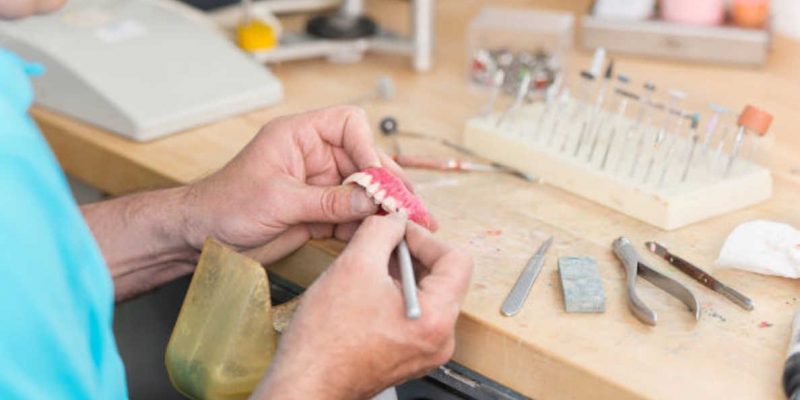Why are dental technicians important?
Dental technicians are those key members of a dental team who are usually not given the credits that they deserve. The work of a technician requires a high level of manual dexterity and attention to detail and an application of applied aesthetic values.
They are those secret jewelers who are equally responsible for crafting that perfect smile, as the dentists themselves. They are an integral part of the patient care pathway. They have the ability to manipulate an assortment of ceramics by layering different shades of porcelain to create beautifully colored and contoured teeth that can enhance the beauty of a patient’s smile and overall appearance.
Each patient is unique and no two cases are the same, therefore much of the work is carefully done by hand to fine-tune each piece to the exact specification to make sure the device is comfortable and effective for the patient prior to the final fitting with the dentist. There is a wide range of materials used in dentistry. In order to design and construct appliances to precision, these technicians have knowledge about the properties and application of each of these materials.
Their scope of work is vast—
- Prosthodontic technicians specialise in designing and making removable prosthesis, which can be made of acrylic or chrome cobalt – complete dentures, implant-retained overdentures and cast partial dentures. This also includes crowns, bridges, veneers, copings, attachments and fixed implant restorations using materials like ceramics, zirconia, metals. Splints for TMDs and appliances for sleeping disorders are also made by them.
- Orthodontic technicians are specialised in designing and making removable orthodontic appliances with wires, springs, and screw, pediatric appliances like space maintainers, retainers and myo-functional appliances.
- Conservative technicians focus on inlays and onlays using a wide range of materials, including porcelain, gold or metal alloys, and bleaching trays.
- Maxillo-facial technicians or maxillofacial prosthetists/anaplastologists are in great demand in hospital with oral surgery, ophthalmic, burns and cancer units, where they help to reconstruct faces damaged by disease or accident using acrylic or silicone prosthesis, which may include magnets or implants – extra oral prosthesis like ocular, orbital, nasal, auricular prosthesis and intra-oral prosthesis like obturators and flange prosthesis.
Respect them as professionals
A healthy relationship between dentists and dental technicians is essential to enhance overall patient care. Dentists should understand that dental technicians do not work in a very favourable environment. They are subjected to constant loud sounds of trimming and drilling machinery. Also, the dust generated during the trimming of the prosthesis poses a threat of occupational hazards. Adding to this is the risk of infection transmission from dental clinics through impressions. Despite all these unfavorable working conditions, they try to deliver the best for patients.
When we publish post-treatment clinical photographs with final prostheses in scientific journals or dental magazines and take all credits, do we ever remember the art that these technicians have put into the restorations?! They work hand in hand with the dentist to breathe life into our restorations!
There has been a change in the way in which we manage dental disease and rehabilitate patients with missing teeth. This patient-centric approach necessitates a sound dentist-technician relationship in order to ensure optimum outcomes. Technicians must feel comfortable enough to inform dentists if they are unhappy with clinical quality issues (eg tooth preparation, denture design, impression quality).
Tips to help our technicians deliver better
In today’s highly demanding world of dental esthetics, the lab technician’s role is more important than ever! How can we help technicians for a better prosthetic outcome? Here are some takeaway points:
1. Good communication – this cannot be stressed enough. Poor communication can be the difference between a happy patient and a remake.
- Use the lab work sheets well when you send across work, filling in all necessary details or sit together with your local technician and make a custom work sheet comfortable for you both.
- Sending photographs holding up the shade guide against a gray card before and after tooth preparation, is the best way to communicate shade to your technician.
- Brief your technician about the patient- age, gender, personality. Is the underlying restoration amalgam? Do all surrounding teeth have fluorosis? Does the patient smoke or chew tobacco? All these determine the overall look of the prosthesis.
2. Give your lab feedback – if something worked well, great, give positive feedback. A lot of effort goes into making dental appliances, which the patient, and often the clinician, is unaware of. It is nice to hear that the patient was happy with the crown. On the other hand, if something didn’t go as planned tell the lab, they cannot fix something if they don’t know about it!
3. Remember to disinfect – not just your impressions but all appliances that have been in the patient’s mouth.
4. Only send your best effort – if you look at your impression and think it could be better, do it again. It will probably save you time and effort in the long run.
References
1. Dental Technicians: Unsung Heroes of Dentistry.International Journal of Prosthodontics and Restorative Dentistry 10(1):2-2
2.Pietrobon N, Malament KA. Team approach between prosthodontics and dental technology. Eur J Esthet Dent 2007;2(1):58–7
3.Al-Omoush SA, Abdul-Baqi KJ, Zuriekat M, et al. Assessment of occupational noise-related hearing impairment among dental health personnel. J Occup Health 2019;62(1):e12093.




















Comments